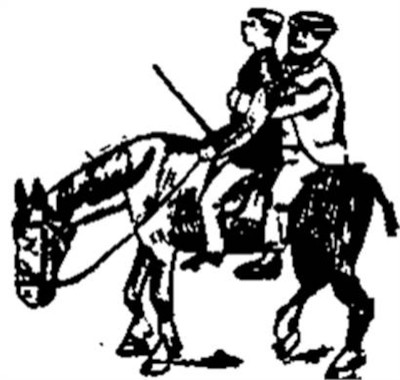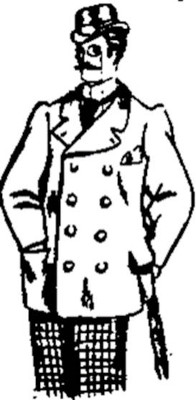
This article has been transcribed from a copy of the Cardiff Times in the online collection of scanned Welsh newspapers 1804-1919 in the National Library of Wales, with grateful recognition of the free access accorded to all readers. Paragraph breaks have been introduced for easier reading.
'Mr Eccles, of immortal memory': Old Eccles is a character in the comedy drama Caste (1867) by Thomas William Roberson. The part was first played by George Honey at the Lyceum Theatre in London. Click on image to enlarge it. —— David Skilton

hen Mr Eccles, of immortal memory gave forth to his own particular world his opinion on the labour question it took the following form:— 'I don't work so much as I used to, but I like to see the young 'uns work: it does 'em good.' Which from both points of view expressed may be taken as a fairly veracious statement. Mr Eccles was not the only man who liked work at a distance, and it is really extraordinary how many people there are in the world who manage to get along without that commodity. They are like the ex-convict who said 'I dare say that honesty is the best policy, but thank goodness I've been able to do without it so far.'

Has no Need to Work
Some people do not work for the simple reason that they've no work to do; others remain idle for no other reason than the fact that they are too lazy to do any work even if they had the opportunity.
These men are to be found in large quantities in the ranks of the professional agitators, and are always to the fore when a strike occurs. On such occasions they point out to the men who do work that they are slaves, that they are not paid fair wages for their labour, and that they are working long hours for low wages, in order that their employers may get at their expense.

A Nocturnal Worker
Work has been defined as the best imitation of genius, and it is certain that no work of genius has ever been completely without work, and that of the closest and most exacting nature.
People frequently imagine that a genius in any branch is a man to whom work is practically an unknown quantity, and that he produces his grand effects with perfect ease. No greater mistake was ever made, and the men who hold the foremost positions in the world are men who have laboured long and laboured hard ere they reached even the lowest rung of the ladder of position or success. They know better than any one that no success and no perfection is ever attained without work. The very ease with which they produce their masterpiece is the result of hard work. Failure after failure has had to be overcome ere they reached perfection, and there is no work so tiring as that which seems to bring one no nearer to the goal in view, but which is in reality smoothing the way to a grand climax.

Worked to Death
When a man who had worked for 30 years trying to find out the secret of the manufacture of a certain kind of pottery ware, with apparently no measure of success, was told tauntingly by his only child that he was no nearer the end in view than on the first day he commenced his experiment, he replied, 'No nearer? Why I am 30 years nearer.' And the truth of his assertion was proved by the fact that a few months afterwards he found out the secret he had worked for 30 years to discover.
With some people work is essential to both health and happiness, and the man who has been at business all his life, and eventually retires, finds himself in a few months feeling miserable for want of work. For years he has been used to going to his office at regular hours and doing a certain amount of work per day. It has become part and parcel of his life, and when, having made sufficient money to enable him to give it up, he finds he is daily and hourly pining for it. This may sound absurd to such as find work irksome, but it is an undisputed fact that men have died after retiring from the mere fact that they did not get out of the rut they had run in from youth to old age. It is told of a man who retired in this way that he went back to the people who had bought his business and offered to do his old duties without salary. He wanted to be about the place, and could not live away from it.
Work is a panacea for more than one human ill, and many a man would go out of his mind were he compelled to give up, working. In the mind of the busy man there are no crevices left for those thoughts and memories which are apt to turn men sour and to add to the list of suicides. It is no uncommon thing for a doctor to proscribe work instead of medicine, for occupation is a sad destroyer of melancholia and its attendant evils.
Work brings its pleasures, and there can be no greater pleasure to the man who has worked for years with a certain aim in front of him than to find that his labours are at last crowned with success. The results of long and consistent labour are to be found in the walks of Science, Art, and Literature.

Doesn't Know Why People Work
No one is so bad to convince of the value and necessity of work as the beginner in any of the three lines named above. They leave off where the master feels that he is only just beginning, and when told that a picture has taken a great painter years of labour to finish they open their eyes in blank astonishment, and pointing to an effort of their own tell you with conscious pride that it only took them a few days to paint. Note the difference between the two works, and it will not be difficult to put its real value on work.p
No man is worthy of the name who does not work, in whatever manner; and the idlers, who do no good, would themselves be far more successful and happier if they put their shoulders to the wheel and did some honest, sensible work.
Links to Related Material
- Samuel on Some Men who Live without Working
- Samuel on Some Busy Idlers
- Samuel on Inadequate Salaries
Last modified 25 April 2022